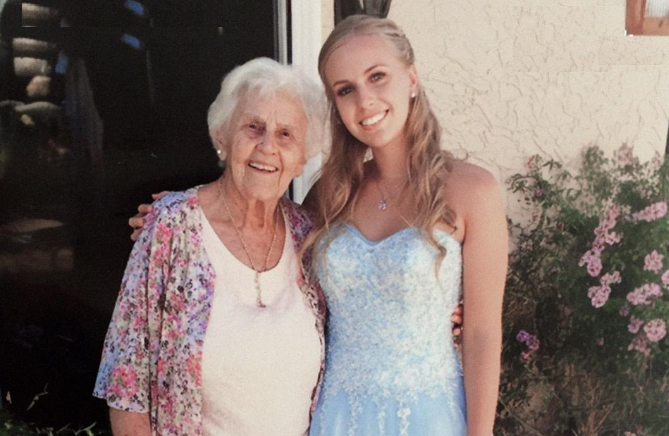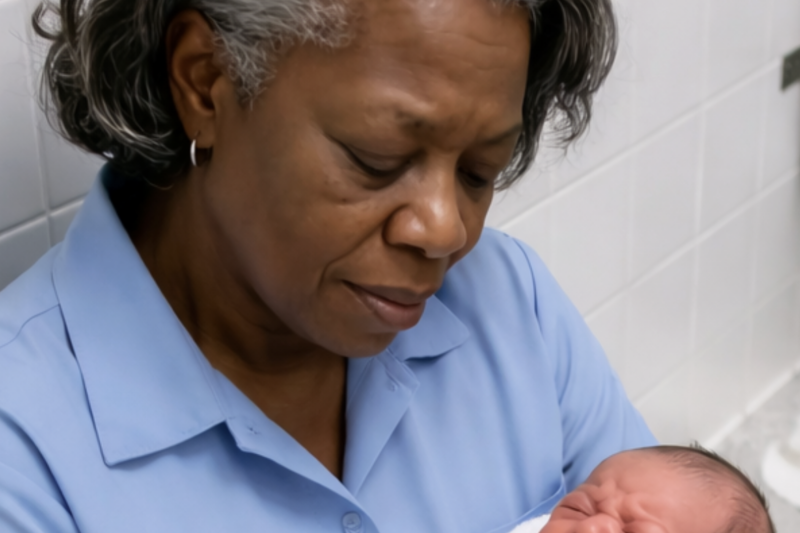After nurturing my granddaughter Emma through the loss of my son, I believed the toughest times were largely in the past. Yet, when my former daughter-in-law, Melissa, appeared unexpectedly at our doorstep with a luxurious gown and an envelope, I learned that some individuals could act in ways far more heartless than I had ever envisioned.
Sixteen years earlier, at 56, I was still navigating life in modest rental apartments. My son, Mark, accomplished a milestone I never reached. At 29, he purchased a cozy one-story home for his wife, Melissa, and their daughter, Emma. A construction worker with weathered hands and grand aspirations, he shared his plans over coffee in their small kitchen. “Mom,” he said, “I’m going to expand this place—add rooms, build a porch, maybe even a swing set out back. I’ll make a space above the garage for you, too.” His pride warmed my heart, and to secure his family’s future, he drafted a simple will, designating the house to Emma in case of tragedy. But before he could bring his vision to life, a construction accident claimed him. Emma was only two.
At the funeral, I held Emma’s tiny hand as Melissa greeted mourners with an icy demeanor. Back at the house, I caught her packing a suitcase. She was 27 then. “Look after her,” she said curtly, tossing me the house keys as I tried to reason with her at the door. Outside, she slipped into a sleek luxury car with a man grinning in the driver’s seat. The car hummed as they sped off, leaving Emma and me in the driveway. That was the last we saw of her. I moved into Mark’s house with Emma, taking every job I could to cover the mortgage and keep us fed.
I scrubbed houses until my knees throbbed, cared for neighbors’ children, and served tables at a diner until my feet ached. Years rolled by. Now in my 70s, my back creaked each morning, and my face carried more lines than I could tally. Yet, my spirit remained strong, and Emma blossomed into a kind, considerate young woman. She never asked for much, despite her friends coming from wealthier homes. She wore thrifted outfits with flair and told me she loved me often.
I knew, though, that every high school girl longed to feel radiant at her senior prom. Weeks before the event, I asked Emma if she planned to attend. She shook her head gently and said, “Grandma, it’s okay. I don’t need to go. We can’t afford a dress, and I checked Goodwill—nothing fits right.” Her casual tone hid her disappointment, but I saw it, and it pained me to see her miss out. She deserved her moment. The next day, I found soft blue satin fabric at a vintage shop, affordable enough to buy.
That evening, after my diner shift, I pulled out my old sewing machine and set it on the kitchen table. I began crafting her gown. Emma noticed and insisted I already did too much, but I wasn’t too weary to see her smile. I wove love into every stitch, working for days until my fingers stiffened and my eyes stung. The night before prom, Emma slipped into the finished dress in our narrow hallway, twirling before the mirror. The fabric shimmered softly in the light, and her eyes glistened with tears. “It’s the most beautiful dress I’ve ever seen,” she whispered. “Thank—”
A sharp knock on the front door interrupted her. I opened it and stood stunned. There was Melissa, beaming on our porch. Time had etched lines on her face—she was 43 now—but she looked striking, her makeup flawless, her hair impeccably styled. Her designer heels clicked as she stepped inside, uninvited, a glossy garment bag slung over her shoulder. “My baby girl!” she exclaimed, enveloping Emma in a theatrical embrace. Emma stiffened, bewildered, and I watched, equally confused. Melissa hadn’t reached out once since abandoning her daughter. Yet, she carried on with fervor, unzipping the bag with a flourish to reveal a glittering silver gown, likely worth more than my three months’ wages. “I brought you something special,” she cooed, holding it up. Her gaze slid over Emma’s homemade dress. “Prom’s tomorrow, isn’t it? I overheard some girls at a boutique. You can’t wear that,” she said, wrinkling her nose. “They’ll mock you. Take this—it’s a proper prom dress.”
Something felt wrong, but for a moment, I hoped she genuinely wanted to reconnect. The gown was stunning, and Emma would look like royalty. Emma bit her lip, glancing between her reflection and the silver dress. Before I could suggest she try it on, an envelope fell from Melissa’s purse onto our worn carpet. Emma picked it up, and we both noticed her name scrawled boldly across it. “What’s this?” she asked, holding it. “Oh, it’s nothing for you to worry about now,” Melissa said, reaching for it.
But Emma opened it, and I leaned in, slipping on my reading glasses. Inside were legal documents—formal papers with signatures and seals. “Melissa, what are these?” I asked, dread rising. Her smile wavered. “June, let me explain,” she said, her tone softening as she turned to Emma. “Sweetheart, this house was meant for our family. Your father bought it for us, right?” “I suppose,” Emma replied, blinking. “So, it makes sense for me to manage it now. Sign those papers, and I can sell this place. We could move somewhere better—somewhere glamorous. You don’t have to stay in this small town with all this clutter. We could live the life we’re meant for.”
Silence blanketed the room. I saw through her intentions—she wasn’t here for Emma but for what she could gain. Emma’s hands shook as she held the papers, but her voice was firm. “You think a dress makes you my mom? You think you deserve this house that Grandma worked so hard to keep, raising me all alone?” “Sweetheart, that’s not—” “You abandoned me,” Emma cut in, her voice rising. “Now you probably need cash to maintain whatever lifestyle you’re chasing. But I see you clearly, and you’ve come to the wrong place. This is my house. I’m 18. Grandma is my family. This house belongs to us!”
With that, Emma ripped the papers to pieces. As the scraps fell to the floor, Melissa’s smile vanished, her face contorting with anger. “Ungrateful child,” she spat, grabbing her purse. “You’ll regret this when you’re broke in your 20s, caring for a frail old woman.” I gasped, but before I could respond, she snatched the garment bag, her heels clacking like thunder as she stormed out, slamming the door. Emma’s arms wrapped around me tightly. That was that, I thought, relieved.
The next evening, prom night arrived. Emma smoothed her blue dress in front of the mirror, offering me a resolute smile. “Ready, Grandma?” I grabbed my car keys, and we walked to my old sedan. I dropped her off at the school, wishing her a wonderful time. Past midnight, I heard gravel crunch in the driveway. Her friend had driven her home, and I stepped out to greet her. Emma ascended the porch steps, her curls loose, mascara smudged, but her smile radiant. “How was it, honey?”
She hugged me tightly, whispering, “I was the most beautiful girl there. Because of you.” We sat on the porch, and she shared every detail. Her friends hadn’t mocked her dress—they’d called it unique and stunning. She’d danced and laughed all night. “It was the best night ever,” she said before heading inside to rest. I lingered outside, thinking of her future. This was the start of her new chapter. With a partial scholarship for architecture, Emma would head to college in the fall, still living here with me.
Through all my efforts, I’d raised a remarkable young woman who valued love over wealth or appearances. She was her father’s daughter, and this was her home. I hoped Melissa would never try to disrupt that again.




